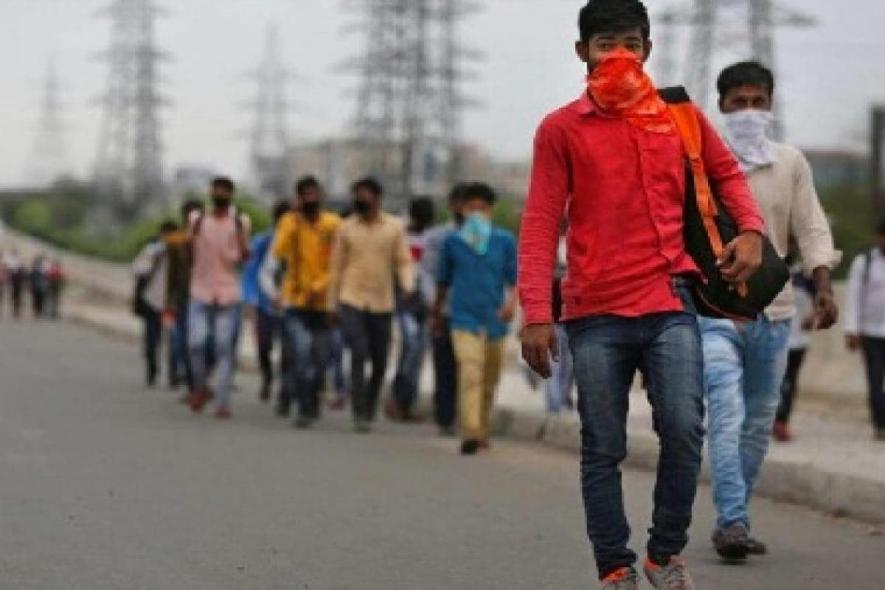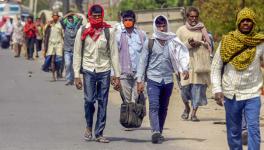Over 2,000 Complaints Filed by Indians on Labour Rights Violation in Qatar Since July 2019: RTI

Representational Image. Image Courtesy: Firstpost
As many as 2,068 complaints filed by Indian workers were received by the Indian embassy in Doha, Qatar, from July 2019 till April 8, related to “violation of contract term by employers” and “harsh” working conditions, an RTI response has revealed.
The Right to Information (RTI) response also revealed that out of 1,510 Indian nationals who had requested the embassy for assistance with repatriation, 1,181 had been repatriated. The remaining could not be repatriated due to reasons such as non-operation of flight services currently between Qatar and India, non-settlement of their issues with the sponsors, ongoing court cases, among others.
The RTI response by the Indian Embassy in Qatar seems to indicate that the conditions under which many Indian migrant workers in the Gulf country work, continues to be precarious, despite the Qatari authorities highlighting labour reforms initiated in the country in the past few years.
Subrahmanyam Jaishankar, India’s minister of external affairs, had informed the Lok Sabha in July 2019 that there had been over 77,000 complaints by Indian workers regarding labour abuse violations in Bahrain, Qatar, Saudi Arabia, Oman, Kuwait and United Arab Emirates from January 2016 till June 2019. In Qatar alone, 10,778 such complaints had been filed.
Jaishankar had further stated in Parliament that: “Most of the complaints received from and on behalf of Indian workers are regarding non-payment of salaries and denial of legitimate labour rights and benefits such as non-issuance/renewal of residence permits, non-payment/grant of overtime allowance, weekly holidays, longer working hours, refusal to grant exit/re–entry permits for visit to India, refusal to allow the worker on final exit visa after completion of their contracts and non-provision of medical and insurance facilities, not being paid compensation upon death, etc.”
The RTI response and Jaishankar’s statement in Parliament show that almost 13,000 complaints have been filed by Indian workers in Qatar from 2016 till April 8, 2020. There are an estimated 6,50,000 to 7,00,000 Indian migrants in Qatar, many of whom are blue-collar workers employed in the construction sector.
Qatar has been under fire for human rights violations of blue-collar migrant workers in the country ever since it won the bid to host the 2022 FIFA World Cup in December 2010. For the first time in history, the FIFA World Cup will be held in the winter to avoid temperatures of around 50°C. However, that luxury has not been provided to the workers who have been giving their blood, sweat and tears to construct the many stadia in the country.
Have Labour Reforms in Qatar Been Successful?
The Qatari authorities have initiated some labour reforms in the past few years after critical international media coverage of the plight of migrant workers. In March 2018, a Labour Dispute Resolution Committee had been set up so that disputes could be settled within three weeks of a migrant worker having filed a complaint.
However, an Amnesty International report, titled “All Work, No Pay: The Struggle of Qatar’s Migrant Workers for Justice”, published on September 19, 2019, had revealed that hundreds of migrant workers in the country were waiting for unpaid wages and compensation since March 2018.
Amnesty International’s Deputy Director of Global Issues, Stephen Cockburn, had said: “Despite the significant promises of reform which Qatar has made ahead of the 2022 World Cup, it remains a playground for unscrupulous employers. Migrant workers often go to Qatar in the hope of giving their families a better life; instead many people return home penniless after spending months chasing their wages, with too little help from the systems that are supposed to protect them.”
The reason behind the exploitation of migrant workers in Qatar is because of the exploitative Kafala System which gives the power to the employers to:
1) Sponsor the workers’ visa and issue their residence permit.
2) Stop a worker changing jobs, often up to five years.
3) Report workers as having “absconded,” leading to arrest or deportation
4) Control whether domestic workers and others can leave the country by issuing exit permits.
The requirement of an exit permit for most migrant workers was removed in September 2018. Recently, on January 16, exit permits were removed for all expatriates who are not covered under Qatar’s labour law. This included the ones in the oil and gas sector, sea and agriculture industry, public workers and domestic workers.
However, this still does not cover all migrant workers in that country. Domestic workers have to inform their employer that they intend to leave the country 72 hours in advance of their departure. Campaigners had pointed out how this could spell trouble for 1,75,000 domestic workers in the country, majority of whom are women.
Rothna Begum, a senior researcher at Human Rights Watch, had told The Guardian, “In doing so, they haven’t really thought through what it means, because it could still be an exit permit through the back door – which means that effectively domestic workers could still be trapped in the country.”
Only time will tell how much impact such a reform will have in improving the lives of migrant workers in Qatar
How India Has Dealt With The Situation
The RTI response also revealed the process by which the Indian embassy seeks to ensure justice for the exploited workers. It stated: “On receipt of such complaints, the Embassy tried to contact the employer and resolve the matter amicably. The Embassy arranges one-way air tickets for repatriation of needy Indian nationals, using the Indian Community Welfare Fund, in deserving cases. If the issue is not resolved amicably, the Embassy takes up the matter with authorities, in the government of Qatar, in particular the Ministry of Labour and Social Affairs, Labour Dispute Settlement Committees, the National Human Rights Committee and the Ministry of Interior. The Embassy also works with the appellate body setup in the Ministry of Interior, for redressing grievances related to delays in securing exit permits for expatriate workers.”
While the Qatari authorities have been under spotlight for not caring enough about the blue-collar migrant workers, one needs to ask whether the Indian government has done enough to bring justice to the workers and safeguard their rights. During Prime Minister Narendra Modi’s visit to the gulf country in June 2016, he had raised the issue of Indian migrant workers with the monarch of Qatar Emir Sheikh Tamim Bin Hamad Al-Thani.
A statement issued by the Prime Minister’s office had said, “The Qatari side briefed the Indian side on the reform in labour laws which would protect the interest of skilled and unskilled labour in Qatar.” However, the number of complaints increased in 2017 to the Indian embassy in Qatar to 3,328 from 2,747 in 2016. The number of complaints then dipped slightly to 3,244 in 2018.
With more than 10,000 complaints being filed by Indians in less than four years, it is hard to believe that the Prime Minister having a word with the Emir of Qatar four years ago has had much relief for the vulnerable workers in the country.
Migrant Workers in Qatar Stranded During COVID-19
With the COVID-19 pandemic raging on, questions have been raised regarding the plight of migrant workers stuck in the six Gulf countries. In April, a plea by the migrant welfare society, Pravasi Legal Cell, was filed in the Supreme Court seeking evacuation of the labour force trapped in the six countries.
The plea stated that “migrant workers in the Gulf countries are being denied treatment in the Hospitals even after testing positive for COVID 19 and are told to stay back in their house or camps itself. This is because the number of patients who are getting infected is going up, there is a shortage of beds in government hospitals so first preference is given to their own citizens. It is also unaffordable for the migrant workers to go to a private hospital, due to the high cost of treatment. So the workers who are even tested positive, stay back in rooms to avoid a hospital bill.”
However, the Indian government has shown willingness to evacuate other Indians in various parts of the world -- from students in China to Shia Muslim pilgrims in Iran. This was highlighted in the plea, which further stated: “It is humbly submitted that as per reports, the
Indian Government has conducted special flights to evacuate Indian citizens stranded in various countries due to COVID19, however, till now not even a single such special flights have been arranged to bring back the stranded poor migrants in Gulf countries.”
Since the beginning of May, there has been respite for some workers stranded in the Gulf. The Vande Bharat Mission, a repatriation programme to bring back Indians stranded in different parts of the world began on May 7. Two Air India Express flights came from Doha to Kerala in the first phase of the repatriation programme from May 7 to May 13. On Wednesday, 182 Indians came from Doha to Thiruvananthapuram in Kerala.
However, the number of flights that are subsequently expected to come from Qatar won’t be enough to bring back the majority of the workers in the Gulf. The Indian Express reported that three lakh Indians have registered for return from the Gulf region but only those with “compelling reasons” according to the Indian embassies will be able to return home.
The Guardian newspaper had reported earlier this month that blue-collar migrant workers were forced to beg as the pandemic raged on in the Gulf nation. Qatar has one of the highest rates of per capita infections of the virus in the world. The Ministry of Public Health of the State of Qatar had reported that the majority of the 640 tested earlier this month were migrant workers.
The conditions under which Indian workers from developing countries like India are subjected to in Qatar is arguably the worst for migrants in any part of the world and with the pandemic raging on, crippling society like never before, their situation has become worse than one would have imagined.
While migrant workers being forced to walk hundreds of kilometres in India is at least being extensively covered by the country’s press, the ones stranded in Qatar are being made invisible by the country they have helped build and the country they call home.
The writer is an independent journalist. The views are personal.
Get the latest reports & analysis with people's perspective on Protests, movements & deep analytical videos, discussions of the current affairs in your Telegram app. Subscribe to NewsClick's Telegram channel & get Real-Time updates on stories, as they get published on our website.
























